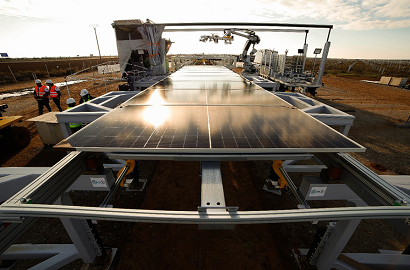EDP tests automation technology to build solar parks in Spain

It is the first experiment in the world involving this technological solution, based on robotics and advanced computing.
The Portuguese renewable energy company EDP has chosen a project located in Spain, for the first time in the world, and under real conditions of large-scale installation, to test the construction of a solar energy park with automation technology, based on robotics and advanced computing.
The AutoPV project, located in Peñaflor (Valladolid), will have an installed capacity of 122 MW. The robotic solution will be used to construct installations generating a total of 3 MW. The technology has been developed by the Italian company Comau, which specialises in designing and manufacturing robots and automation solutions for different industries, such as the automotive industry and shipbuilding.
Mobile plant
This pilot project involves constructing a part of the solar park by using a mobile plant called Hyperflex. This portable plant has an automatic assembly station where the solar energy structure is pre-assembled. An autonomous vehicle then transports and positions the structure in its final location. The aim is to reduce the assembly time of the solar panel structure by up to 50%.
The mobile plant arrives at the construction site transported by truck. There it is unloaded and assembled for operation. After the operation phase, it is dismantled again to be moved to a new park under construction. EDP identified this opportunity to automate some construction operations and initiated an in-depth study of available solutions in 2022. The step towards implementing this solution was taken in July this year.
Strategic focus on investment and growth
With this milestone implemented in Spain, EDP Innovation CEO António Coutinho is positioning his company “at the forefront of the global trend towards automation in the renewable energy industry”, explaining that, “By investing in such an innovative solution, we are contributing to making the construction of solar parks faster, more efficient, safer and more sustainable. We believe that technology and innovation are a decisive ally in accelerating the energy transition, which is why this is a strategic area for global investment and growth at EDP.”
This process delegates the heavier tasks to robots, while workers are engaged in more specialised technical functions. This not only improves efficiency but also increases safety in the workplace. As Coutinho points out, the Penaflor pilot is in any case “only the first step in introducing automation solutions into EDP's robust solar business plan. EDP's objective is to transform it into a global and integrated process, capable of generating competitive advantages for all the company's operations and empowering our human capital to complete more skilled activities.”
According to Comau CEO Pietro Gorlier, the partnership with EDP “confirms the importance and added value of automation in the renewable energy industry and in particular, in this case, for installing solar panels. It is also a recognition of our ongoing commitment to developing innovative but also flexible solutions to meet different needs.”
Photo: EDP




